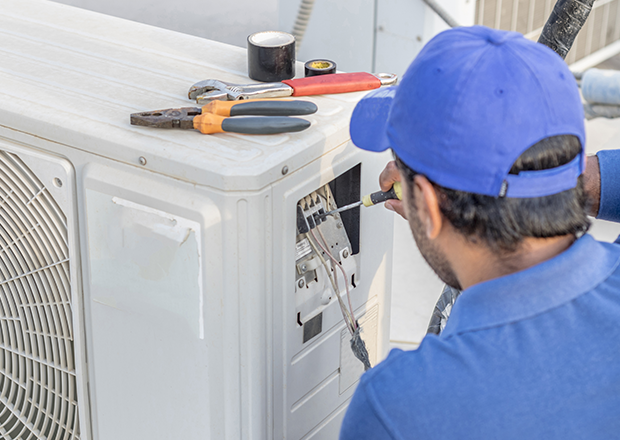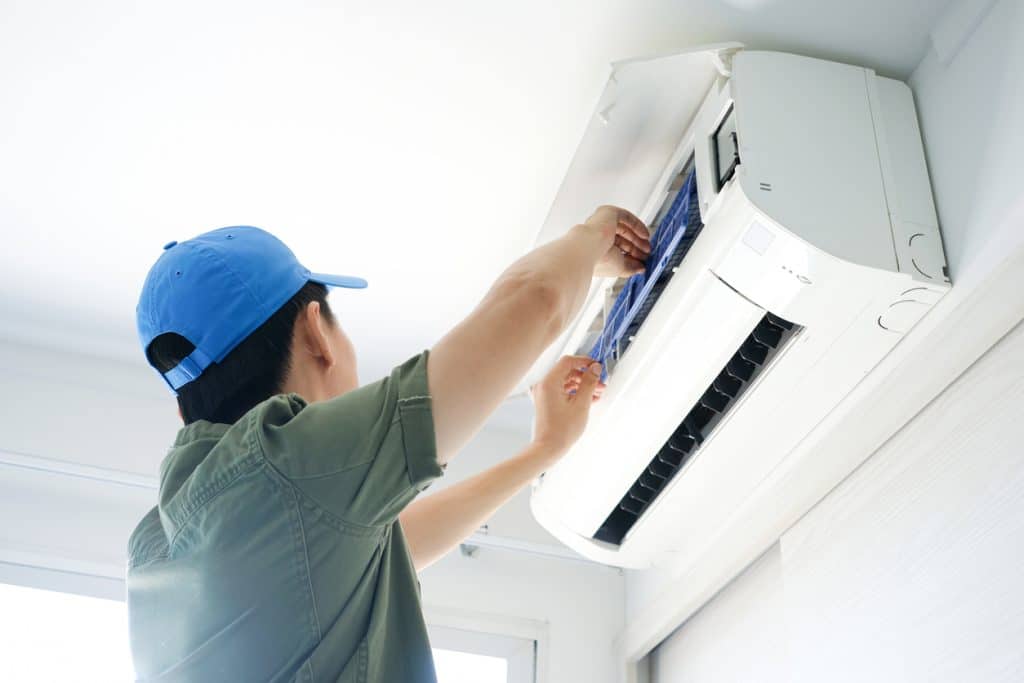Clear indicators that you need air conditioner repair immediately
All About A/c: Identifying Common Issues and Effective AC Repair Service Techniques
Cooling and heating systems are essential for maintaining indoor comfort. Recognizing their elements and functionality is crucial for identifying typical issues. Home owners often deal with issues such as inefficient cooling, unusual odors, or rising energy expenses. These signs can show underlying concerns that may need focus. Discovering do it yourself troubleshooting strategies can be useful, however recognizing when to look for expert help is similarly essential. What steps can be taken to assure lasting performance?
Comprehending Your A/c System: Elements and Capability
A heating and cooling system, usually taken into consideration the foundation of interior environment control, contains numerous crucial parts that collaborate to control temperature and air quality. The key components consist of the home heating system, ventilation system, and cooling device. The heating unit, normally a heating system or central heating boiler, generates heat during colder months, while the cooling unit cools interior areas during the summer season.

Typical Heating And Cooling Troubles Home Owners Experience
Homeowners typically encounter several typical HVAC problems, consisting of irregular temperature level circulation throughout their living rooms. In addition, uncommon sounds throughout procedure can indicate underlying problems that require focus. Attending to these issues without delay is essential for preserving excellent system efficiency.
Inconsistent Temperature Circulation
Lots of families experience the aggravating issue of irregular temperature circulation, where specific rooms really feel annoyingly warm while others continue to be as well cool. This issue frequently emerges from a variety of variables, consisting of poor insulation, obstructed vents, or an improperly sized HVAC system. When air ducts are not effectively sealed or when furnishings obstructs air flow, some areas may obtain insufficient air conditioning. Furthermore, thermostat positioning can greatly influence temperature level law; a thermostat located in a sunlit area might misstate the overall temperature level of your house. Normal upkeep, including cleaning filters and guaranteeing ductwork is clear, can aid minimize these disparities. House owners might likewise consider zoning systems to far better control temperatures throughout various locations of the home, promoting a much more comfy living setting.
Uncommon Sounds During Operation
When a cooling and heating system operates, unusual sounds can show underlying issues that require interest. Home owners may experience an array of audios, such as grinding, squeaking, or hissing. Grinding noises usually signify damaged bearings or parts, while squealing can recommend loose belts or parts needing lubrication. Hissing may suggest a cooling agent leakage, which can jeopardize the system's performance. In addition, banging noises may indicate loosened ductwork or a concern with the blower follower. Each of these noises works as a warning, triggering home owners to investigate better. Ignoring these signs can lead to more significant issues and expensive repair work. Regular maintenance and prompt focus to uncommon sounds can boost system long life and performance, making sure a comfortable living environment.
Signs That Indicate Your Air Conditioning Needs Repair Work
How can one inform if their cooling system is in requirement of repair work? Several indicators might show underlying concerns needing expert attention. If the Air conditioner stops working to cool the room successfully, it may suggest a cooling agent leak or compressor breakdown. Furthermore, an increase in power expenses without matching usage adjustments might signal inadequacy in the system. House owners ought to additionally look out to uncommon smells rising from the unit, which can indicate mold and mildew growth or electric issues. Moreover, if the air conditioning frequently cycles on and off, it may be a sign of a damaged thermostat or other mechanical troubles. Finally, the existence of water pooling around the system can show a stopped up drainpipe line. Recognizing these indications early can conserve time and money, making sure that the cooling system operates successfully and effectively.
DIY Troubleshooting Techniques for Cooling And Heating Issues
When encountering HVAC problems, homeowners can utilize a number of do it yourself troubleshooting methods to determine the trouble. Trick methods include inspecting thermostat settings, examining air filters, and evaluating drainage problems. These steps can assist determine usual breakdowns prior to looking for professional aid.
Inspecting Thermostat Setups
What actions should home owners take to guarantee their thermostat setups are correct? They need to validate the thermostat is established to the wanted temperature and setting, whether home heating or air conditioning. Looking for a clear screen and verifying the thermostat is not set to "hold" or "getaway" mode is crucial. Property owners should also validate that the thermostat is degree and set up in a place devoid of drafts, direct sunshine, or other temperature affects. In addition, rectifying the thermostat can assist offer exact analyses. If the thermostat runs on batteries, replacing them may resolve any type of concerns. By systematically reviewing these factors, homeowners can frequently determine and correct thermostat-related problems, advertising excellent a/c system performance.
Inspecting Air Filters
Air filters play an important duty in preserving ideal a/c performance. They catch dust, allergens, and various other bits, ensuring tidy air circulation. With time, filters can end up being clogged, minimizing airflow and efficiency. To inspect air filters, individuals need to first situate the filter, commonly found in the return duct or near the furnace. As soon as located, they ought to assess the filter's condition-- if it appears dirty or tarnished, it likely demands substitute. A lot of filters require transforming every 1-3 months, depending upon usage and environmental variables. Normal inspection and timely replacement of air filters not only boost air high quality however likewise extend the lifespan of a/c systems, stopping possible malfunctions and costly repair services.
Reviewing Drainage Issues
How can house owners properly identify and deal with drain concerns within their cooling and heating systems? They should inspect the condensate drain line for clogs or obstructions, which can lead to water build-up. House owners might utilize a wet/dry vacuum cleaner to remove any debris obstructing the line. Next, inspecting the drain pan for rust or leaks is necessary, as a harmed frying pan can trigger water to overflow. Routine cleansing of the drainpipe line with a combination of vinegar and water helps prevent future clogs. Furthermore, making sure proper slope of the drainpipe line advertises efficient water flow. If these DIY strategies do not fix the problem, getting in touch with a specialist a/c technician might be needed to prevent potential water damages and system failure.
When to Call a Professional for AC Repairs

While some AC concerns can be dealt with through DIY methods, there are scenarios where calling a specialist ends up being important. Home owners ought to look for professional aid when they come across persistent troubles, such as insufficient cooling, strange noises, or unusual smells originating from the device. These signs and symptoms might indicate deeper concerns that need specialized knowledge and devices to diagnose and fix correctly.

Preventative Maintenance Tips for Cooling And Heating Longevity
Normal preventative maintenance can considerably enhance the durability of cooling and heating systems. House owners need to schedule yearly examinations by certified technicians to evaluate system effectiveness and determine possible issues. Regularly changing or cleaning up air filters is crucial, as this guarantees appropriate air movement and decreases stress on the system. Additionally, checking and sealing ductwork protects against energy loss and improves general efficiency.
It is also recommended to maintain the outdoor unit clear of particles and plant life, enabling peak air flow and warmth exchange. Property owners must evaluate the condensate drain for clogs to stay clear of water damage and mold and mildew development. Moreover, maintaining suitable thermostat settings and utilizing programmable choices can enhance energy effectiveness. Recording maintenance tasks aids track solution background and can help in determining repeating issues. By following these preventative steps, individuals can make the most of the efficiency and life-span of their a/c systems
Regularly Asked Questions
How Typically Should I Change My A/c System Filters?
HVAC system filters should usually be replaced each to 3 months, depending upon usage, filter kind, and environmental elements. Regular replacement helps preserve efficiency and air quality, making certain peak system performance throughout the year.
What Dimension Cooling And Heating System Do I Need for My Home?
To establish the appropriate a/c system size for a home, one need to consider square footage, insulation high quality, and neighborhood environment. Consulting a professional can help ensure optimal effectiveness and convenience for the particular living room.
Exist Eco-Friendly Heating And Cooling Options Available?
Yes, green heating and cooling choices are readily available, including energy-efficient heatpump, solar-powered systems, and geothermal home heating. These choices lower energy usage and ecological influence, promoting sustainability while preserving reliable climate control for domestic and industrial rooms.
Just How Can I Improve My heating and cooling System's Power Performance?
To boost HVAC energy efficiency, one can on a regular basis keep the system, seal air leakages, mount programmable thermostats, make here use of energy-efficient filters, and guarantee appropriate insulation throughout the home to decrease energy consumption and boost performance.

What Is the Ordinary Life-span of an A/c System?
The average life-span of a heating and cooling system generally varies from 15 to 25 years, depending upon variables such as maintenance, use, and the high quality of setup. Normal upkeep can significantly prolong its functional longevity.
Final thought
In recap, a thorough understanding of a/c systems encourages property owners to determine usual issues and address small issues successfully. Identifying indicators of malfunction, utilizing do it yourself repairing methods, and prioritizing regular maintenance can boost system efficiency and performance. However, when faced with complex repair services, getting specialist help is important to ensure safety and security and long life. By cultivating understanding and positive care, individuals can delight in a comfortable indoor environment while minimizing unforeseen expenses connected with a/c failures.